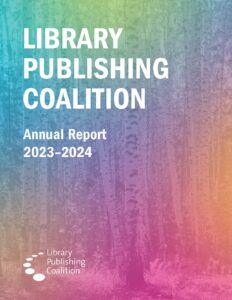Library Publishing Coalition Releases 2023–2024 Annual Report

The Library Publishing Coalition released of their 2023–2024 Annual Report.
In addition to outlining LPC’s finances, membership, and ongoing inclusion efforts, the Annual Report highlights several programmatic milestones, including:
- Launching LPC’s new Community Plan
- Celebrating 10 years of LPC by the numbers
- 10th Anniversary Service Leadership Award
All the people involved in this work offered their time, energy, and expertise to fulfill our vision of an open, inclusive, and sustainable scholarly publishing landscape.




